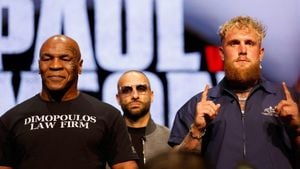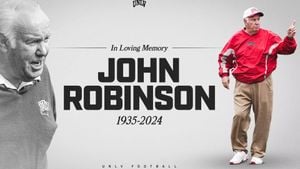Oprah Winfrey's recent involvement with Vice President Kamala Harris' campaign has ignited quite the controversy, causing her reputation to come under scrutiny from her hometown newspaper, the Chicago Tribune. Reports surfaced claiming Winfrey had accepted $1 million for her appearance during Harris’ campaign event, raising eyebrows and prompting serious questions about the appropriateness of such compensation.
Winfrey clarified her stance, stating she did not personally take any payment; rather, her production company, Harpo Productions, received the funds to organize the star-studded town hall event. This detail was meant to assure the public and her critics alike, yet it seemed to backfire as the Tribune editorial board took the opportunity to launch their veiled critique.
The editorial board did not hold back, expressing doubt over Winfrey's decision to let her company accept the substantial payment instead of covering the event's production costs herself. They wrote, "Frankly, $1 million is not all much to Winfrey and so we very much doubt she was seeking any kind of personal payday from her chosen candidate." Despite this acknowledgment, they pointed out her ownership and position as the chairwoman and CEO of Harpo Productions, implying the production fees ought to be treated as campaign contributions.
Winfrey's involvement was marked by the extravagant nature of the event, which featured various celebrities who made virtual appearances, including renowned actors like Julia Roberts, Meryl Streep, and Jennifer Lopez. This stellar lineup contributed to the spectacle of the event, which had production expenses totaling about $15 million, with Harpo Productions taking home the $1 million cut for their services, according to reports.
Critics were quick to label the town hall as little more than what one writer described as "a starry infomercial." The Tribune explicitly pointed out how they felt the event seemed to spotlight celebrity over substance. They argued, “Rather than do such events, the Harris campaign would have been much more effective had Harris engaged directly with independent journalists. This would provide her the chance to discuss her plans on issues of immediate importance to voters.
The narrative surrounding celebrity involvement in political campaigns struck another chord, especially as discussions arose over the efficacy of such strategies. The Chicago Tribune implied Harris's campaign was more about creating shine among elite Hollywood circles rather than genuinely addressing the pressing issues confronting everyday Americans. They stressed, "Celebrity osmosis did not work; voters wanted to hear more about what Harris would do for them."
This incident, occurring during the closing rallies of Harris’s campaign, has triggered discourse about the relationship between high-profile endorsements and the fundamental principles of political campaigning. Critics from varying political stripes have emphasized the need for candidates to share concrete details about their visions instead of relying heavily on star power.
Responding to the backlash, Winfrey took to social media, clarifying her position: "I was not paid a dime. My time and energy was my way of supporting the campaign. I did not take any personal fee. The people who worked on the production needed to be paid. And they were. End of story," she expressed, aiming to dispel the narrative surrounding her motives.
Despite her clarifications, the Tribune maintained its critique, hinting at discomfort over the presentation format of the event; the paper suggested the organization of the gathering drew attention away from the substantive discussions voters wished to hear about policy. They remarked, "Part of the problem with celebrities is they tend to come with entourages or, more accurately, production needs. Having someone with a large following simply stand next to the candidate at a podium is one thing; doing a full livestreamed production event with someone like Oprah Winfrey is entirely another," they noted.
The backlash against Harris’s campaign tactics has not ended with Winfrey. Recently, it was revealed her campaign accrued $20 million worth of debt by election day, even after raising upwards of $1 billion from various donors. Critics were already vocal about the campaign's heavy reliance on celebrity performances, such as election-eve concerts featuring pop icons like Lady Gaga and Katy Perry, which reportedly cost around $20 million to produce.
This cascade of criticism didn’t solely stem from the Chicago Tribune; broader media outlets like The Washington Post and Los Angeles Times abstained from endorsing candidates, painting a rather bleak picture of Harris's campaign strategy. While prominent backers may ignite enthusiasm among certain groups, it’s evident they may also contribute to narratives casting candidates as out of touch with the average voter.
Winfrey, long regarded as one of America’s beloved public figures, may face continued scrutiny over the decisions made concerning her involvement with the campaign. Harris’s $1 million payout to Harpo Productions, coupled with the grandiosity of celebrity engagement, raises urgent questions about the future of campaign financing practices and the extent to which celebrity endorsements effectively empower voters.
Discussions surrounding this topic aren’t likely to fade anytime soon. With the 2024 election looming, all eyes are set on the candidates and their strategies to bridge the gap between high-profile endorsements and relatable, concrete engagements with the electorate.
The events may have shifted minds both inside and outside of Harris's camp, leaving echoes of the past strategies to guide future engagements with voters leading up to and past the next elections.



